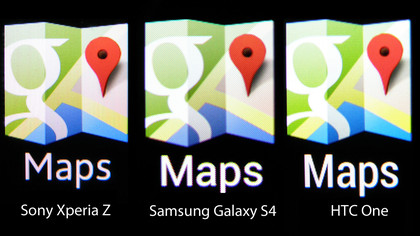HTC One vs Samsung Galaxy S4 vs Sony Xperia Z
The ultimate shootout between the world's best smartphones

The HTC One takes things in a different direction, and that's not necessarily a bad thing. The 4MP UltraPixel camera is probably one that most of you are familiar with, but here's a quick overview: a 4MP sensor can have bigger pixels, which let it more light for an overall brighter photo - excellent in lower lights where you don't want a flash.

It can also capture and process them more quickly, as there's less information to chug through, and you can take some really clear and in focus shots. The downside is the resolution is noticeably lower and while the subject your aiming at is generally clear, the rest of the picture can be noisy and a little fuzzy.
Another new feature we like: the HTC One lets you capture Zoes, which are 3.6-second clips instead of a photo. These not only automatically make highlight reels of your night out or holiday, but also let you do really cool things like sequence shot and object removal much more easily than with the Samsung Galaxy S4.
Samsung promises excellent low-light snaps from the S4 as well, but it simply cannot take on the might of the HTC One when trying to get the photo in even near-darkness.
The HTC One is best for day to day shooting, which is really important on a cameraphone, but it really depends on what you're intending to use your phone for. The good news? If you're after a decent cameraphone, you're going to get something more than decent from any of the options here.
CPU / RAM
All three phones are pretty similar here: the One, Z and S4 all pack 2GB of RAM to help power things along, but as you can see from the benchmarking graphs, Sony is struggling to keep up with the other two.
Its results are surprising, given that it's packing a 1.5GHz Krait chip from Qualcomm that's also supplemented by an Adreno 320 GPU (which is also present in the other two). However, it performs markedly worse than the competition, which you can put down to the lower clock speed.
Get daily insight, inspiration and deals in your inbox
Sign up for breaking news, reviews, opinion, top tech deals, and more.
HTC made the decision to move to Qualcomm Krait, and despite being slower than the Galaxy S4 (coming in at 1.7GHz clockspeed) manages to match it blow for blow in the benchmarking tests. It also performs nigh-on flawlessly even in the heavy lifting.
The Samsung Galaxy S4 is much the same in terms of interface, but raises the bar to 1.9GHz in speed terms. As we mentioned, this has very little effect when it comes to benchmarks, but it does impress given the battery life isn't impacted massively.
We're going to give this one to Samsung for just edging it in terms of pure specs. Sure, it matters what you do with it, but it seems the South Korean brand has managed to be a bit kinder on the battery. We just wish that we were allowed to buy that octa-core version…
Screen
This is such an important part of the smartphone experience, and all three offer something different in display terms, although Full HD resolution has been packed into each handset.
We'll start with the Sony Xperia Z, which has the poorest screen on test. A standard TFT LCD, it's certainly crisp but really suffers when viewed from any other angle than straight-on. We would have thought this wouldn't be an issue, but the amount of times we were really surprised at the washed-out screen when looking at it from the side was much higher than anticipated.

Click here for the full-res image
The HTC One has the brightest screen, but the Galaxy S4 has a much more balanced tone with the Super AMOLED (which has been set to the most neutral colour mode) when viewed normally. The Sony Xperia Z has the best clarity, but that comes at a price as it's also the most noisy.

Gareth has been part of the consumer technology world in a career spanning three decades. He started life as a staff writer on the fledgling TechRadar, and has grew with the site (primarily as phones, tablets and wearables editor) until becoming Global Editor in Chief in 2018. Gareth has written over 4,000 articles for TechRadar, has contributed expert insight to a number of other publications, chaired panels on zeitgeist technologies, presented at the Gadget Show Live as well as representing the brand on TV and radio for multiple channels including Sky, BBC, ITV and Al-Jazeera. Passionate about fitness, he can bore anyone rigid about stress management, sleep tracking, heart rate variance as well as bemoaning something about the latest iPhone, Galaxy or OLED TV.